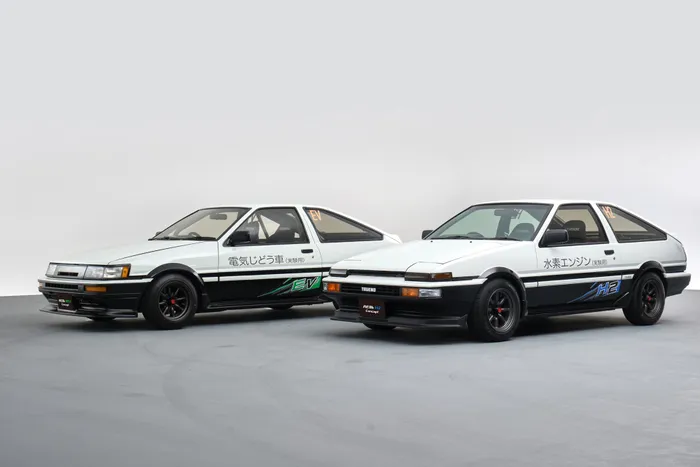Back to the future as Toyota mods old EA86 coupes with hydrogen and electric power

The Toyota EA86 BEV Concept (left) and EA86 H2 Concept (right) show how iconic models could be given a new lease on life.
Chiba, Japan - In an eye-catching bid to show that cars can be clean while appealing to old-school petrolheads, Toyota has revealed zero-emission versions of its 1980s EA86 coupe, which still boasts a strong global fan base.
At an industry event for customised cars in Chiba, east of Tokyo, the Japanese carmaker unveiled two cars of the AE86 generation, one modified as a battery-electric vehicle and the other as a hydrogen-engined model.
Toyota President Akio Toyoda said remodelling existing cars needed to be explored as an option to achieve a goal of zero carbon emissions by 2050. In Japan, only one in about 20 cars on the road are new, and older ones are mainly powered at least partly by petrol.
"It's important to leave a choice for cars that are already loved or owned by someone," Toyoda, a self-confessed car-lover and race-car driver, said at the event.

The hydrogen-powered EA86 H2 Concept retains its internal combustion engine with minimal modifications, except of course the necessary changes to the fuel injectors, fuel pipes and spark plugs. The hydrogen is stored in a pair of high-pressure tank sourced from the Toyota Mirai fuel cell electric vehicle.
The EA86 of the 1980s was powered by the high-revving 4AGE 1.6-litre twin-cam engine that also did service in SA’s Conquest RSi, among other models.
But for those keen to leave internal combustion behind completely, Toyota has developed the fully-electric EA86 BEV Concept, which is fitted with an electric motor from the Tundra hybrid bakkie and a battery from the Prius plug-in hybrid.
To take their green credentials even further, both EA86 concepts have reupholstered seats and seat belts made from recycled materials.
Toyota is a relative newcomer to the mass electric car market market, but the carmaker currently has plans to invest $70 billion to electrify its vehicles and produce more batteries. Toyota aims to sell at least 3.5 million battery electric models in 2030.
IOL & Reuters
Related Topics: